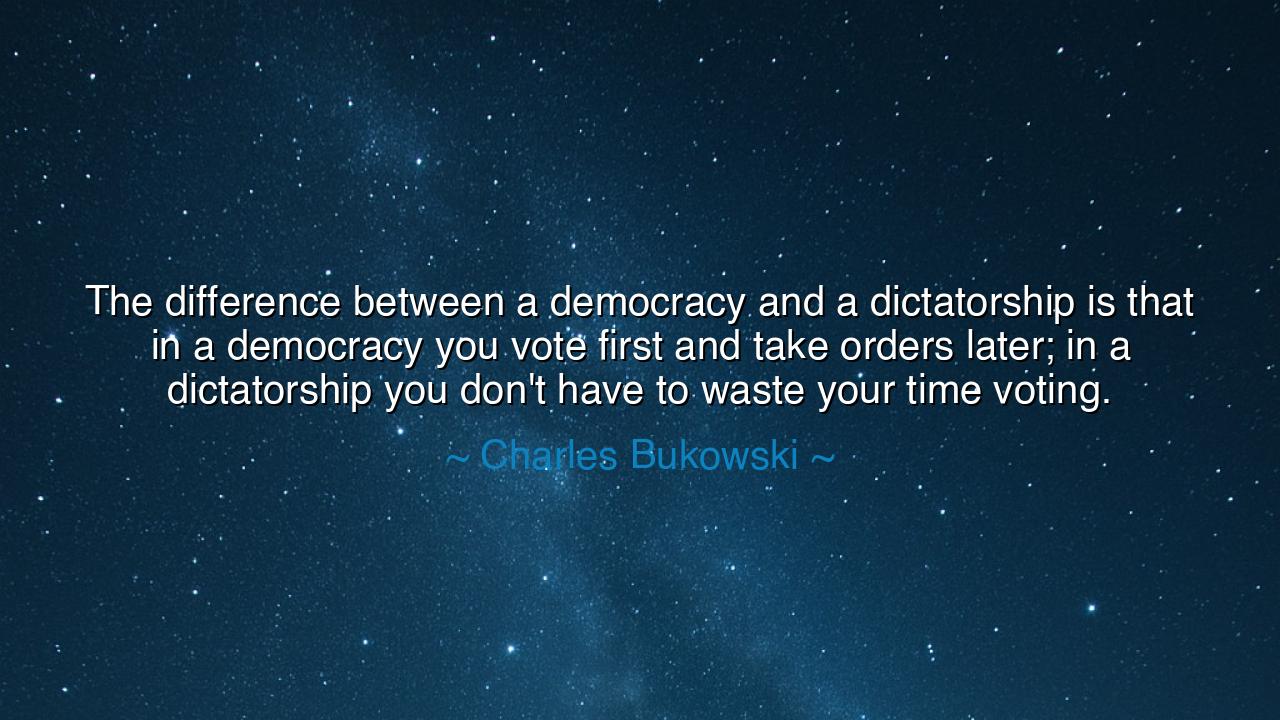
The difference between a democracy and a dictatorship is that in
The difference between a democracy and a dictatorship is that in a democracy you vote first and take orders later; in a dictatorship you don't have to waste your time voting.






The words of Charles Bukowski, poet of the raw and restless soul, carry a bitter humor that reveals a deeper truth: “The difference between a democracy and a dictatorship is that in a democracy you vote first and take orders later; in a dictatorship you don’t have to waste your time voting.” Beneath the wit lies a reflection on power, freedom, and the illusion of choice. His words do not mock democracy outright, but warn that even the systems we call free often bind us in unseen chains.
The meaning is layered. In a dictatorship, the people are openly denied their voice; no one pretends otherwise. Orders come from above, and resistance is crushed. But in a democracy, though citizens cast their votes, the reality often remains that power still commands, decisions are made by a few, and obedience is expected. The difference, Bukowski suggests, is that democracy maintains the appearance of choice, while dictatorship dispenses with the pretense. It is a cynical observation, but also a call to see the world as it is, not as we wish it to be.
Bukowski, who lived much of his life as an outsider, mistrusted authority in all its forms. He saw in both democracy and dictatorship the reality that ordinary people must still navigate systems of control, regardless of the promises made by leaders. His quote reflects this disillusionment: that the rituals of voting, parliaments, and speeches may comfort the masses, yet the commands of power still descend upon them in the end.
History offers many examples to illustrate this. Consider the fall of the Weimar Republic in Germany. Citizens voted, parties clashed, and democracy appeared alive. Yet out of this process rose Hitler, who swiftly transformed democracy into dictatorship. The people had voted, and then they obeyed—until freedom itself vanished. Bukowski’s observation is laid bare in this tragedy: voting alone cannot guarantee liberty if vigilance and courage are absent.
Yet the same truth warns us not to despair but to be awake. In nations where democracy survives, the people must guard it fiercely, lest it become a hollow ritual. To vote is not enough; one must also speak, resist, demand accountability, and refuse to be lulled into passive obedience. Otherwise, democracy becomes but a gentler mask for the same chains that bind in tyranny. The orders will always come, but in democracy the people have the chance, however fragile, to shape them.
The deeper teaching is this: all systems of governance, whether cloaked in freedom or draped in oppression, reveal the eternal struggle between power and the people. Bukowski’s words challenge us not to be naïve, not to assume that voting alone guarantees freedom, but to recognize that liberty is maintained through engagement, courage, and the refusal to bow blindly to authority. His cynicism, though sharp, points us toward vigilance.
The lesson for you, seeker, is this: do not waste the gift of your voice. If you live under democracy, do not take the act of voting as the end of your duty—it is only the beginning. Question authority, hold leaders accountable, and remember that freedom is fragile, always in danger of erosion. If you live under dictatorship, let the awareness of truth burn within you, for even the fiercest chains cannot extinguish the fire of human dignity.
So remember, children of tomorrow: whether in democracy or in dictatorship, orders will come, and power will command. The difference lies in whether the people remain awake or asleep, engaged or indifferent. Bukowski’s words, though edged with bitterness, are a call to vigilance. For only a people who see clearly, who act bravely, and who refuse to surrender their will, can transform the orders of the powerful into the true voice of the many.






AAdministratorAdministrator
Welcome, honored guests. Please leave a comment, we will respond soon